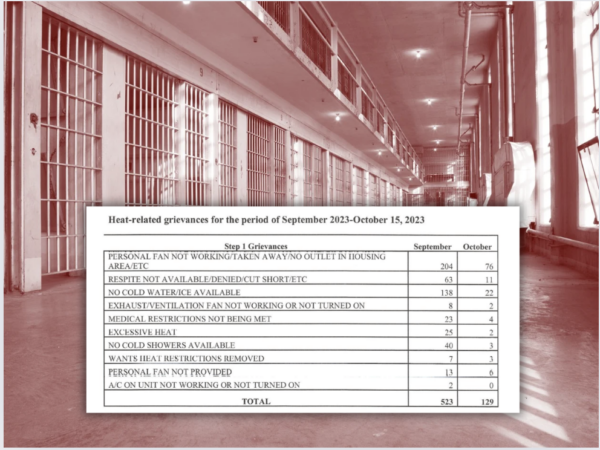Documents Reveal Thousands of Texas Prison Heat Complaints in 2023 — and Perilously Slow Grievance Process
Records obtained by American Oversight and reported on by NPR show that incarcerated individuals in Texas state prisons filed thousands of heat-related complaints.

In 2023, amid a deadly heat wave, Texas raised the price of water bottles for inmates in state prisons by 50 percent. And according to documents obtained by American Oversight and reported on by NPR, between May and October of that year, people incarcerated in Texas state prisons submitted more than 4,200 individual heat-related complaints.
The recently obtained records also highlight the complicated process for filing and elevating grievance complaints in Texas state prisons, and include videos with heat mitigation strategies recommended by the Texas Department of Criminal Justice (TDCJ) — many of which cost money, even though incarcerated people are not paid for their work in prisons run by the state.
NPR’s “All Things Considered” reported on the records this month, shortly after several advocacy organizations joined a lawsuit against TDCJ arguing that the extreme heat in Texas prisons amounts to cruel and unusual punishment.
Most prisons in Texas do not have air conditioning, and the high temperatures i an prisons in the state and across the South have drawn increased attention as climate change threatens the region with more extreme weather. In 2023, the Republican-controlled Texas House proposed spending $545 million to install air conditioning in the majority of state prisons; the bill died in the Senate.
The TDCJ records obtained by American Oversight show that inmates in TDCJ-run prisons filed 4,680 heat-related grievances between May and October 2023. According to TDCJ, in August 2023, there were 129,653 people incarcerated in state facilities.
The complaints are labeled as “Step 1” and “Step 2” grievances. According to the Texas Civil Rights Project,* a Step 2 grievance may only be filed after an inmate has filed a Step 1 complaint and received a response from TDCJ, which may take up to 40 days. If the inmate is not satisfied with the resolution to the Step 1 grievance, they can appeal that decision with a Step 2 grievance. In TDCJ prisons, incarcerated people are limited to filing one grievance per week.
The records list a total of 4,259 Step 1 grievances and 421 Step 2 grievances. The most common grievance types, as categorized by TDCJ, include issues with or a lack of a personal fan, respite being denied or unavailable, lack of cold water or ice, and “excessive heat.”
The records obtained by American Oversight also include orientation videos for inmates and prison staff that include details about heat mitigation strategies. Several interventions suggested in the videos require purchases from the prison commissary, such as electrolyte drinks, sunscreen, and cooling towels. Fans must also be purchased, but may be provided to inmates who cannot afford them “on a first come, first served basis,” one video states. Inmates in Texas state prisons are not paid for their labor, a practice that is widely criticized by advocacy groups.
Texas has not reported a single heat-related death in a state prison since 2012, but researchers and advocates have disputed that fact. In 2022, a study led by a researcher at Brown University’s School of Public Health found that an average of 14 deaths per year were associated with heat in Texas prisons without air conditioning. The following year, the Texas Tribune reported that 41 incarcerated individuals had died in uncooled Texas prisons during a summer heatwave. Researchers have also found that prison suicide rates increase after heatwaves.
American Oversight has filed several other records requests seeking information about the treatment of people in Texas detention centers. In 2021, we obtained complaints, reported on by the Houston Chronicle, about conditions inside the Galveston County Jail during a winter storm that left the facility without running water, leading to drinking water shortages and unsanitary conditions.
Read more about our work in Texas here.
*Correction: An earlier version of this article misattributed information about the grievance project to the Texas Legal Services Center. That information came from the Texas Civil Rights Project’s Prisoners’ Rights Program. The article has been corrected.